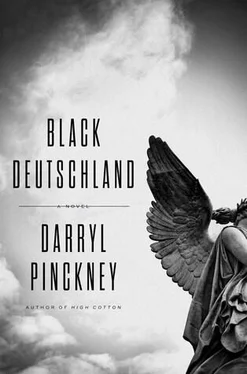More so than my father or my brother, Dram represented to me the man who embraced with gusto his part in the life he’d made. He did not doubt he was entitled to his sense of well-being, his freedom to luxuriate in the squeals of his children, to defy his wife as her protector, to spoil her as his woman, to be indifferent to the domestic help once they’d been vetted. He stood his ground when wolfing at another man over a parking place directly in front of his building. He swung his dick widely in everything he did. Plus, he wasn’t motivated by German guilt. The men in Dram’s father’s family married cultured women, one of whom had recent Jewish-convert blood, which had put her children at risk during the Third Reich. Then, too, it became known in the 1970s that Dram’s mother had assisted people during the war who were hiding Jews and communists in the vicinity of Lake Constance.
Dram never once mentioned to his mother that the brilliant pianist he’d met when he was in graduate school was black. He told his parents that he was going back to Boston to get the woman who was to bear his children and when their taxi drove up Dram’s mother did not exclaim, You’re a Negro. Cello claimed that seven years later her mother-in-law had still not referred to her being black. The only thing she ever said, Cello boasted, was that her grandchildren were going to be beautiful.
Cello’s little sister, Rhonda, was the family knockout. My mom taught her early to grab a leaf or slap a wall, to do something aggressive when men were behind her on a street. Mom worked hard to countermand whatever Cello’s mother had told them about sex, without letting on that she considered their mother on the loose side. To her credit, Cello never saw herself as a beauty, no matter how imposing in her prim voluptuousness she had schooled herself to come off as. The fat girl lived on inside her, violent in her feelings against the rice pudding her children loved.
Dram’s sister played for the company on Cello’s first afternoon in Berlin. He had an upright in his apartment, but he got Cello a practice room with a good Blüthner down in Dahlem. Finally, the family was too curious and one Sunday lunch they begged her to play. This is Cello’s version of events. She doesn’t know why she chose a Chopin nocturne she’d never been able to master and so had never played to her own satisfaction or to anyone else’s, to be honest. When she was telling me this, I noticed in a way that I enjoyed how once again Cello had inserted into a story about herself some criticism meant to show how honest with herself she was capable of being. She was hard on herself. She knew that. It was a fault. She worked on it. Cello said that when she finished the nocturne, Frau Schuzburg came up behind her and whispered to her that she would never forget what Cello was giving up to marry Dram.
To my credit, I did not give in to the bitchiness I felt toward her at that moment. I did not say, What was that? As in, What did you give up? Because I knew she meant her concert career. It never took off, I knew, because she had coughing jags in the wings before she was to sit down to play for performances or just before she was to place herself under a recording microphone. The career she’d never know whether she could have had or not. I didn’t ask why Frau Schuzburg assumed Cello would be giving it up. I also refrained from asking how she had managed not to have one of her fits when playing for Dram’s family.
Someone once compared her to Philippa Schuyler, the prodigy whose Harlem Renaissance father, George Schuyler, a black journalist married to a white woman, held her up as an example of biological advancement through the mixing or “invigoration” of the races. Cello never spoke to that someone again. Black girls like Mom followed Shirley Temple’s career in the 1930s and 1940s and had time left over to clip stories about Philippa Schuyler and to tune in to her radio broadcasts. But at some point Schuyler decided that her friendless upbringing on raw food and tour dates had been a form of bondage and she stopped playing the piano. She joined the John Birch Society and died in a helicopter crash in Vietnam. Her mother committed suicide on the second anniversary of her death.
Cello’s sister was Cello’s only relative invited to her wedding on Lake Constance. Mom was very hurt by that.
* * *
I’d come a month early, to settle in, but really to be alone, to drift down memory’s canals while the family was away. But they weren’t going on holiday, after all. And so for those first thirty-one days, my beautiful August, I kept family hours. It had not been blue-black for long when I got into bed with a starchy-feeling towel and I got up when I heard the nanny whining all the way from the kitchen about the mess the children were making already.
I stayed away from Rosen-Montag’s workshop. The new one was still being set up, and they weren’t expecting me until September. He wasn’t back in Berlin yet. I went to the new State Library. Mostly I walked the passageways, train tracks, and dead ends by the river in the old warehouse district northwest of the Reichstag, where Rosen-Montag was to realize some of his schemes about restoring our living spaces to a human scale. So much of it was off-limits and covered up, I couldn’t guess what was going on.
I was also staying out of the apartment. Cello made no demands on me. She didn’t want me too involved with her family. She treated me like a convalescent. She was watching me. I wish she hadn’t told her mother-in-law that I was in AA, because brave Frau Schuzburg gave my hand a squeeze when they had me out to Wannsee for Sunday lunch. She was encouraging me not to end up drunk and behind the wheel.
I was staying out of the apartment so I wouldn’t be smoking in their house. I was free to do so in my room with the window open. But I wanted to impress Cello — and Dram — that I was doing my part to keep clean the air that their children breathed. She’d refused to become pregnant until he quit smoking. Maybe I was also staying out of the apartment in order to be like Dram, a man who came home from work, though I’d nothing to do just yet. Cello shut herself up with the baby grand during the day, interrupting herself frequently to oversee her children’s activities, and when I didn’t go out, it was easy to make myself scarce because that was how we grew up. I hid in my maid’s room, fortified by books and cassette tapes.
Keeping family hours took a decision out of my hands nightly. I would head around the block for a final cigarette, but come in after ten minutes. I turned my back on the city of orgies and joy. I was like someone on parole. I was frightened. I was worried enough that the clichés of the Alcoholics Anonymous Big Book were true that I found an AA meeting in English down in the suburb of Dahlem, near the U.S. army base. Soldiers bitched in country accents about their wives. It didn’t matter to me that the two German women who ran the meeting acted as sponsors to the handsomest of the discontents and never let anyone else talk to them. I was afraid not to go to a meeting. Cello’s “Good night” on Saturday night after I’d been to a meeting was genuinely warm, I felt. It was true that not to drink could make a drunk feel alone and lost.
When I hear recordings of Cecil Taylor live, I am once again downstairs in a West Berlin club, back in the golden age of chain smoking, drinking another glass of white wine in the free zone of staying up all night, talking out the lyric dark, and then falling still as his instrument meets the dawning light—“the brewing luminosity,” Taylor called it. Memory will let in the cool scenes, the hip blowouts. However, the real truth of my summer life in Berlin was held by the plastic interior of a tacky bar. Only the year before I’d spent whole days and nights in the ChiChi Bar, a dive set back from a wide, leafy deserted street behind the plaza of Europa Center.
Читать дальше












